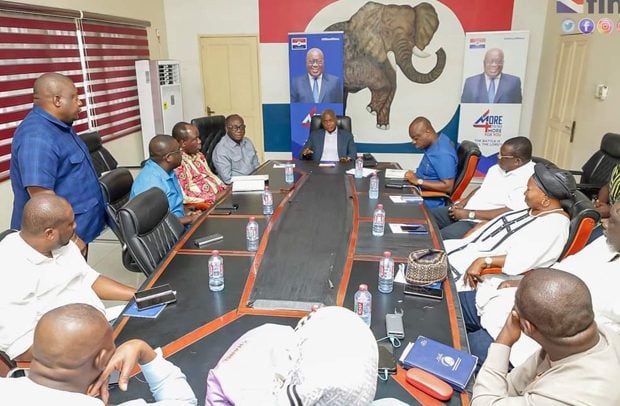The New Patriotic Party (NPP), a prominent political force in Ghana, finds itself at a critical juncture, facing internal scrutiny and calls for leadership change. Dr. Jonathan Asante Okyere, a political science lecturer at the University of Cape Coast, has voiced sharp criticism of the current NPP leadership, arguing that their continued tenure poses a significant threat to the party’s stability and future prospects. Dr. Okyere’s critique comes in the wake of the NPP’s recent defeat in the Akwatia by-election, a result that has amplified concerns about the party’s direction and the effectiveness of its leadership. He contends that the current leadership has demonstrably failed to deliver on expectations and should, therefore, relinquish their positions for the sake of the party’s overall well-being. Dr. Okyere emphasizes the importance of recognizing the opportune moment to step down, suggesting that clinging to power despite mounting dissatisfaction and declining electoral performance is a recipe for internal strife and eventual collapse.
Dr. Okyere’s analysis delves into the specific shortcomings of the NPP leadership, highlighting their apparent inability to adapt to the changing political landscape and effectively address the needs and concerns of the electorate. He argues that their strategies and approaches have become outdated and ineffective, leading to a series of electoral setbacks and a decline in public confidence. The Akwatia by-election defeat, according to Dr. Okyere, serves as a clear indication that the current leadership is out of touch with the electorate and lacks the necessary skills and vision to steer the party back to power. He stresses that the party’s failure to connect with voters and articulate a compelling message resonates with their broader struggles in recent elections. The inability to analyze and learn from these defeats, according to Dr. Okyere, underscores the leadership’s inadequacy and the urgent need for a change.
The call for leadership change within the NPP reflects a growing sentiment among party members and supporters who are increasingly disillusioned with the current trajectory. Dr. Okyere’s public pronouncements articulate the concerns of many within the party who believe that the current leadership has become an obstacle to the NPP’s resurgence. He suggests that the party’s inability to regain power stems, in large part, from the leadership’s resistance to change and their unwillingness to acknowledge their own shortcomings. This reluctance to introspect and adapt, Dr. Okyere argues, has created a stagnation within the party, hindering its ability to connect with the evolving needs and aspirations of the Ghanaian electorate. The Akwatia by-election defeat, in this context, becomes a symbolic representation of a deeper malaise that threatens the party’s long-term viability.
Dr. Okyere’s warning about the potential for internal collapse underscores the gravity of the situation facing the NPP. He argues that the continued grip of the current leadership, in the face of mounting criticism and declining electoral performance, risks fracturing the party along factional lines. This internal division, he warns, could severely weaken the NPP, making it even more difficult to challenge the ruling party in future elections. He emphasizes that the party’s internal cohesion and unity are essential for its success and that clinging to power at the expense of these core principles could lead to irreparable damage. Dr. Okyere’s call for leadership change, therefore, is not merely a critique of the current leadership’s performance but also a plea to preserve the party’s unity and long-term viability.
The current situation within the NPP presents a significant challenge to the party’s future. The calls for leadership change, articulated by figures like Dr. Okyere, reflect a growing recognition that the party needs a new direction and a fresh perspective to regain its political footing. The Akwatia by-election defeat serves as a stark reminder of the consequences of clinging to outdated strategies and failing to adapt to the evolving political landscape. The NPP now faces a critical choice: heed the calls for change and embark on a path of renewal or risk further decline and potential implosion. Dr. Okyere’s analysis and commentary provide a valuable framework for understanding the complexities of the situation and the potential consequences of inaction.
Moving forward, the NPP needs to engage in a serious process of introspection and self-evaluation. The party must critically assess its recent performance, identify its weaknesses, and develop a comprehensive strategy for revitalization. This process should involve a thorough examination of the current leadership’s role and effectiveness. Open dialogue and debate within the party are crucial for navigating this challenging period and charting a course for future success. The ability of the NPP to listen to its critics, embrace change, and adapt to the evolving political landscape will determine its ability to remain a relevant and competitive force in Ghanaian politics. The party’s response to the current crisis will not only shape its own destiny but also influence the broader political landscape of Ghana.














